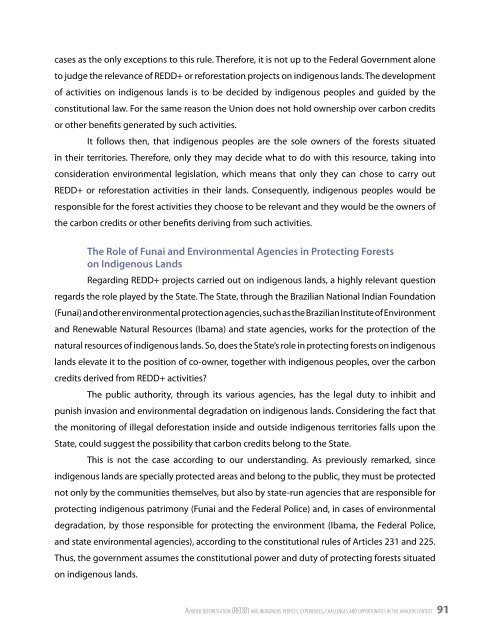Avoided Deforestation (REDD) and Indigenous ... - Amazon Fund
Avoided Deforestation (REDD) and Indigenous ... - Amazon Fund
Avoided Deforestation (REDD) and Indigenous ... - Amazon Fund
Create successful ePaper yourself
Turn your PDF publications into a flip-book with our unique Google optimized e-Paper software.
cases as the only exceptions to this rule. Therefore, it is not up to the Federal Government alone<br />
to judge the relevance of <strong>REDD</strong>+ or reforestation projects on indigenous l<strong>and</strong>s. The development<br />
of activities on indigenous l<strong>and</strong>s is to be decided by indigenous peoples <strong>and</strong> guided by the<br />
constitutional law. For the same reason the Union does not hold ownership over carbon credits<br />
or other benefits generated by such activities.<br />
It follows then, that indigenous peoples are the sole owners of the forests situated<br />
in their territories. Therefore, only they may decide what to do with this resource, taking into<br />
consideration environmental legislation, which means that only they can chose to carry out<br />
<strong>REDD</strong>+ or reforestation activities in their l<strong>and</strong>s. Consequently, indigenous peoples would be<br />
responsible for the forest activities they choose to be relevant <strong>and</strong> they would be the owners of<br />
the carbon credits or other benefits deriving from such activities.<br />
The Role of Funai <strong>and</strong> Environmental Agencies in Protecting Forests<br />
on <strong>Indigenous</strong> L<strong>and</strong>s<br />
Regarding <strong>REDD</strong>+ projects carried out on indigenous l<strong>and</strong>s, a highly relevant question<br />
regards the role played by the State. The State, through the Brazilian National Indian Foundation<br />
(Funai) <strong>and</strong> other environmental protection agencies, such as the Brazilian Institute of Environment<br />
<strong>and</strong> Renewable Natural Resources (Ibama) <strong>and</strong> state agencies, works for the protection of the<br />
natural resources of indigenous l<strong>and</strong>s. So, does the State’s role in protecting forests on indigenous<br />
l<strong>and</strong>s elevate it to the position of co-owner, together with indigenous peoples, over the carbon<br />
credits derived from <strong>REDD</strong>+ activities?<br />
The public authority, through its various agencies, has the legal duty to inhibit <strong>and</strong><br />
punish invasion <strong>and</strong> environmental degradation on indigenous l<strong>and</strong>s. Considering the fact that<br />
the monitoring of illegal deforestation inside <strong>and</strong> outside indigenous territories falls upon the<br />
State, could suggest the possibility that carbon credits belong to the State.<br />
This is not the case according to our underst<strong>and</strong>ing. As previously remarked, since<br />
indigenous l<strong>and</strong>s are specially protected areas <strong>and</strong> belong to the public, they must be protected<br />
not only by the communities themselves, but also by state-run agencies that are responsible for<br />
protecting indigenous patrimony (Funai <strong>and</strong> the Federal Police) <strong>and</strong>, in cases of environmental<br />
degradation, by those responsible for protecting the environment (Ibama, the Federal Police,<br />
<strong>and</strong> state environmental agencies), according to the constitutional rules of Articles 231 <strong>and</strong> 225.<br />
Thus, the government assumes the constitutional power <strong>and</strong> duty of protecting forests situated<br />
on indigenous l<strong>and</strong>s.<br />
Av o i d e d d e f o re s t A t i o n (redd) A n d i n d i g e n o u s p e o p l e s: experiences, chAllenges A n d o p p o r t u n i t i e s in t h e A m A zo n c o n t e x t 91
















